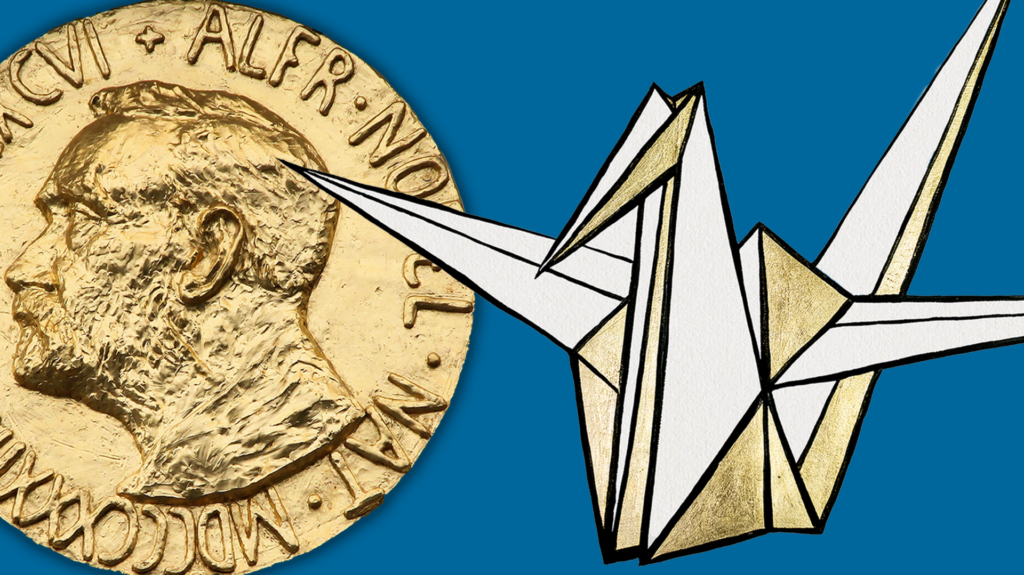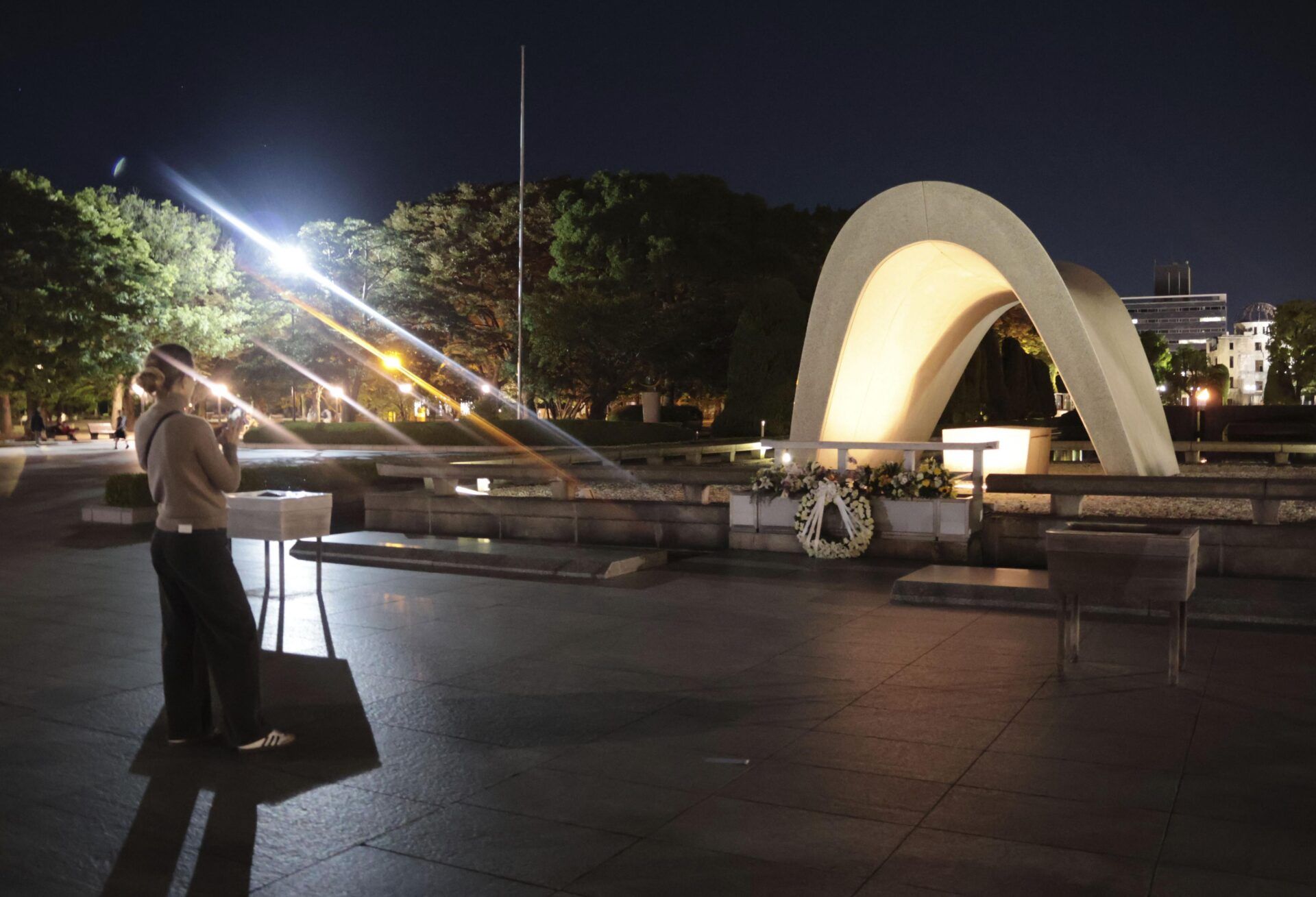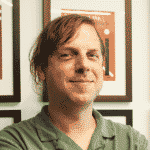Hibakusha group receives Nobel Peace Prize for “demonstrating through witness testimony that nuclear weapons must never be used again”
By François Diaz-Maurin, Thomas Gaulkin | October 11, 2024
 Photo-illustration: Thomas Gaulkin; Nihon Hidankyo logo portrait by Niklas Elmehed / Nobel Prize Outreach
Photo-illustration: Thomas Gaulkin; Nihon Hidankyo logo portrait by Niklas Elmehed / Nobel Prize Outreach
The Norwegian Nobel Committee has awarded this year’s Nobel Peace Prize to the Japanese organization Nihon Hidankyo, a grassroots movement formed by survivors of the Hiroshima and Nagasaki atomic bombings and nuclear weapons testing (or Hibakusha), “for its efforts to achieve a world free of nuclear weapons and for demonstrating through witness testimony that nuclear weapons must never be used again.”
“The extraordinary efforts of Nihon Hidankyo and other representatives of the Hibakusha have contributed greatly to the establishment of the nuclear taboo,” the Norwegian Nobel Committee said in a statement presented by its chair, Jergen Watne Frydnes. “It is therefore alarming that today this taboo against the use of nuclear weapons is under pressure. The nuclear powers are modernizing and upgrading their arsenals; new countries appear to be preparing to acquire nuclear weapons; and threats are being made to use nuclear weapons in ongoing warfare. At this moment in human history, it is worth reminding ourselves what nuclear weapons are: the most destructive weapons the world has ever seen.”
“One day, the Hibakusha will no longer be among us as witnesses to history. But with a strong culture of remembrance and continued commitment, new generations in Japan are carrying forward the experience and the message of the witnesses. They are inspiring and educating people around the world. In this way they are helping to maintain the nuclear taboo—a precondition of a peaceful future for humanity.”
In an interview with the Nobel Prize organization, Masako Wada, a representative of Nihon Hidankyo and survivor of the Nagasaki bombing, said, “The world is currently moving backward on nuclear disarmament. The Russian invasion of Ukraine has caused unspeakable human suffering and raised the risk of nuclear war. I have dedicated my life to nuclear abolition. I feel how sinful humans are. Rather than anger, I feel sorrow, and fear how deep humans will fall into the darkness. We have to keep going forward to convey our wish, our hope to reject nuclear weapons. That’s our mission as Hibakusha.”
Nihon Hidankyo (in English, the Japan Confederation of A- and H-Bomb Sufferers Organizations) was founded in 1956 by survivors of the atomic bombs dropped on Hiroshima and Nagasaki in 1945, along with those who suffered from exposure to radioactive fallout from subsequent hydrogen bomb testing. In Japan, there was a deep sense of injustice over the United States’ refusal to accept responsibility for the suffering of the Japanese population. “For nearly 10 years after the bombing, the Hibakusha received no help from the US occupation forces, which strictly prohibited the people to write or speak about the bombing and damages, including the miserable deaths of 200,000 people, from the Japanese government even after the country regained its sovereignty in 1952,” the organization explains on its website.
For over half a century, Nihon Hidankyo has sent Hibakusha delegations to many parts of the world, giving testimony about the damage and suffering caused by the use of nuclear weapons. In 1974, a Hibakusha delegation first visited the United States and petitioned the United Nations to support an international treaty for a total ban on nuclear weapons. “We are so honored to work alongside Nihon Hidankyo and the Hibakusha to push for the prohibition and total elimination of nuclear weapons,” Daniel Högsta, the deputy director of the International Campaign to Abolish Nuclear Weapons (ICAN), said in a statement shared with the Bulletin. “The Hibakusha, the survivors of Hiroshima and Nagasaki, have worked tirelessly to raise awareness of the catastrophic impacts of nuclear weapons and push for their total elimination. Their testimonies and advocacy have been crucial to nuclear disarmament as a whole and the adoption and entry into force of the UN Treaty on the Prohibition of Nuclear Weapons (TPNW) in particular.”
This year’s award to Nihon Hidankyo is the fourth time the Nobel Committee has recognized the work of grassroots organizations opposing nuclear weapons. Earlier recipients include the Physicians for the Prevention of Nuclear War (1985), the Pugwash Conferences and a key leader, physicist Joseph Rotblat (1995), and ICAN (2017).

This year’s Nobel Peace Prize doesn’t come so much as a surprise as a relief for many in the nuclear disarmament community.
“The fact that most of the Nihon Hidankyo members are reacting to the news of the Nobel Prize with incredulity underscores their feeling that their efforts had not been properly recognized up until now,” Sayuri Romei, senior fellow for Japan at The German Marshall Fund, explained to the Bulletin. “Over the decades, [the movement] has struggled to survive because of the fast-aging hibakusha community, among other reasons. It was about time that their efforts were recognized.”
“I think that the Nobel Peace prize award is well deserved, but it comes very, very late,” said Ray Matsumiya, the executive director of the Oleander Initiative, a group that organizes educational trips to Hiroshima for “peacebuilders from around the world.” “The majority of the Hidankyo survivors are well into their 80s and 90s. The recognition and monetary award would have been better leveraged for our cause, 20 or even 10 years ago,” he added.
There was indeed a sense of urgency, which may explain the timing of this year’s award.
“There is a lot of anxiety in these two towns [of Hiroshima and Nagasaki] about the passing of the hibakusha generation and the maintenance of memory culture,” Robert Jacobs, a nuclear historian at the Hiroshima Peace Institute in Japan and author of the 2022 book Nuclear Bodies: The Global Hibakusha, said. “These are seen as the last years that people will be able to hear testimony directly from hibakusha, and so the role witnessing can play in compelling nuclear abolition, a key part of ‘Hiroshima peace culture’ is slipping away.”
“When there will be no longer anyone to tell those important stories first-hand, it will become increasingly difficult for the next generations to imagine the terrible human costs of nuclear weapons. This removal from first-hand testimonies will have the dangerous effect of forgetting those costs and loosening the nuclear taboo in the future,” Romei warns.
Masako Toki, a research associate with the James Martin Center for Nonproliferation Studies at the Middlebury Institute of International Studies at Monterey, also shares this sense of urgency. “[The Hibakusha] are using their every ounce of remaining energy to accomplish their goals, especially, they are sharing their testimonials with youth, to make sure that people, especially younger generations understand the catastrophic humanitarian impact of the use of nuclear weapons,” Toki told the Bulletin.
In an article for the Bulletin last year, Toki reminded our readers how the Hibakusha, atomic bombing survivors, have worked tirelessly toward a world free of nuclear weapons, with their only wish that no one else would ever go through the sufferings they have experienced. “As the memories of Hiroshima and Nagasaki are further fading away every year given the advanced age of hibakusha, it is urgent for younger generations to learn more,” Toki wrote. “Time is of the essence.”
“The award is clearly linked to the fact that this next August 6th is the 80th anniversary of the nuclear attack here,” Jacobs added.
“This award is long overdue,” Gregory Kulacki, East Asia Project Manager with the Global Security Program at the Union of Concerned Scientists, told the Bulletin. “As we approach the 80th anniversary of the bombing, I suppose the Nobel committee felt it had to do something to recognize the efforts of some of the bravest people I have ever met.” (Nobel Prizes can be awarded only to individuals who are still alive, which explains the committee’s decision to award this year’s prize to Nihon Hidankyo, not individuals working with the organization.)
But for all the symbolism, this year’s Nobel Peace Prize seems to have a purpose beyond the recognition of a past achievement.
“The Nobel Committee’s decision to recognize Nihon Hidankyo is a reminder that human civilization remains precariously tethered to the existence of nuclear weapons and the threat they might be used again,” Daryl Kimball, the director of the Arms Control Association, wrote in a statement shared with the Bulletin. “It is also a call to action for the leaders of the world’s nuclear-armed states and non-nuclear weapon states, to implement concrete steps to refrain from nuclear threats, avert dangerous and destabilizing nuclear competition, and to return to the negotiating table to conclude effective risk reduction and disarmament measures.”
“The timing of this Nobel Prize is especially important as Moscow is ramping up its nuclear saber-rattling,” Romei added. “The voices of the hibakusha will need to be amplified further to contribute to a deeper understanding of all the consequences of nuclear warfare.”
For Jacobs, the award can act as a legacy for the future generations. It will “amplify the voices of the Hibakusha and put their experiences as the only people to suffer direct nuclear attack back in the public mind and conscience. Given that we live in a time of rising anxiety over the potential use of nuclear weaponry in warfare again, these voices need to be heard, and the reality of nuclear usage must be faced and understood. This is likely another motivation of the Nobel committee.”
Kathleen Sullivan, the director of Hibakusha Stories, an organization that for over a decade hosted atomic bomb survivors to share their testimony with youth, primarily from the New York Metro Area, recalls the importance of passing the legacy of the atomic bombings of Hiroshima and Nagasaki to the new generations. “I never really thought about how badly people were hurt by this one atomic bomb,” a student told Sullivan after one such visit. “It really opened my eyes to what can happen if history repeats itself.”
“This award, at this time, will ease this transitional era of the passing of the Hibakusha generation, giving people the sense that their message will endure into future generations,” Jacobs said after today’s announcement. “But it is still up to us to do this work. The award will not accomplish disarmament, but it can motivate us to take this work up.”
“I feel certain nearly every remaining survivor would rather hear that the nuclear-armed states were negotiating in good faith to eliminate nuclear weapons,” Kulacki agreed, “than the news they received a Nobel Prize.”
John Wester, the Archbishop of Santa Fe, shared his hope with the Bulletin “that this Peace Prize awarded to Nihon Hidankyo will get the attention of the nuclear states who have yet to sign the Treaty for the Prohibition of Nuclear Weapons.”
“Now that would be a real prize for the Hibakusha and for all of us!”
Together, we make the world safer.
The Bulletin elevates expert voices above the noise. But as an independent nonprofit organization, our operations depend on the support of readers like you. Help us continue to deliver quality journalism that holds leaders accountable. Your support of our work at any level is important. In return, we promise our coverage will be understandable, influential, vigilant, solution-oriented, and fair-minded. Together we can make a difference.
Keywords: Hiroshima, Nagasaki, Nihon Hidankyo, Nobel Peace Prize, atomic bombings, hibakusha
Topics: Analysis, Nuclear Risk, Nuclear Weapons

















The survivors of the bombing of Hiroshima and Nagasaki deserved to be honored for their long time effort to make sure nuclear weapons are never used again. However, their organization and those supporting the effort to abolish nuclear weapons are moving in the wrong direction. Being “against” nuclear weapons is like being against “hunger” or “poverty.” It does nothing to actually reduce poverty or hunger unless smart workable policies are adopted. The US nuclear deterrent is to deter all forms of major war whether conventional, biological, chemical, cyber, space or nuclear in origin. The US and allied deterrent has prevented… Read more »
Joseph Rotblat was a British physicist who quit the Manhattan Project when Germany was defeated. A lone hero, hence a belated Nobel Peace Prize. Would that all physicists had walked away, preventing the war crimes of Hiroshima and Nagasaki! I hear China has prevailed upon Putin not to use nuclear weapons in Ukraine?